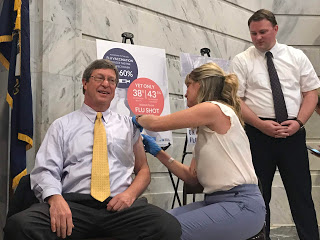To defend against another flu epidemic in Kentucky: ‘Get the shot. Consult your doc. Stop the spread,” campaign says

Nurse practitioner Sara Wellman gives Ben Chandler his shot;
Health Commissioner Jeffrey Howard looks on. (Photo by Al Cross)
—
By Al Cross
Kentucky Health News
Influenza killed 325 people in Kentucky last flu season, when only 40 percent of Kentuckians got a flu shot. The state’s doctors, health agencies and the Foundation for a Healthy Kentucky aim to keep such things from happening this season.
The foundation, the Cabinet for Health and Family Services and the Kentucky Medical Association staged an event in the state Capitol rotunda Tuesday to urge Kentuckians to get a flu shot on Wednesday, Sept. 26 or at least by the end of October.
Flu cases have already been reported, and “Last year was one of the worst years ever for the flu,” which can be at lot worse than an inconvenience, said KMA President Bruce Scott said. He said he can’t understand why some people still think you can get the flu from a flu shot, because “The virus is not live.” He called it “a myth.”
There is no guarantee that any one shot will prevent the flu in any one patient, because viruses, vaccines and patients vary. But every shot is likely to help reduce the effects of the flu. “Even if you get sick you’re going to have an easier time of it if you get your shot,” Foundation CEO Ben Chandler said. “The sad thing is, Kentuckians who live on very low incomes are less likely to get the shot, but are more likely to have the kinds of chronic conditions that make them more vulnerable to serious flu complications.”
Chandler said flu shots are inexpensive and “easy to get,” and to illustrate the point, he, Scott and others got their shots during a break in the press conference. They got “Focus on Flu” bandages that carry the theme of the campaign. He and other speakers urged Kentuckians to post a selfie photo of their arm with the bandage on social media, writing #gotmyshot and #focusonflu.
Flu shots are not available to infants under 6 months and people with compromised immune systems, but the “herd immunity” created by vaccinations of their neighbors gives them some protection, said Dr. Brent Wright, associate dean for rural health innovation at the University of Louisville and a director of KMA’s Kentucky Foundation for Medical Care, which is supporting the effort.
Wright added that you can be a carrier of the flu virus and not get sick, but not if you get the shot.
Allison Adams, president of the Kentucky Health Departments Association, said the agencies will offer vaccinations and education campaigns. The “Focus on Flu” campaign includes public service announcements, education materials, social media messages, and partnerships to make flu shots.
Speakers also noted measures to take if you think you have the flu. Studies show that flu antiviral drugs work best when they’re started within two days of getting sick.
And if you do have the flu, rest at home. “No need to be a stoic,” Chandler said. “You’re just putting others at risk.” People with flu should washing their hands frequently with soap and water, cover their mouth and nose when they cough or sneeze, and limiting contact with others.
The three points of the campaign are “Get the shot. Consult your doc. Stop the spread.” For resources on the flu, see this blog post from the Association of Health Care Journalists.